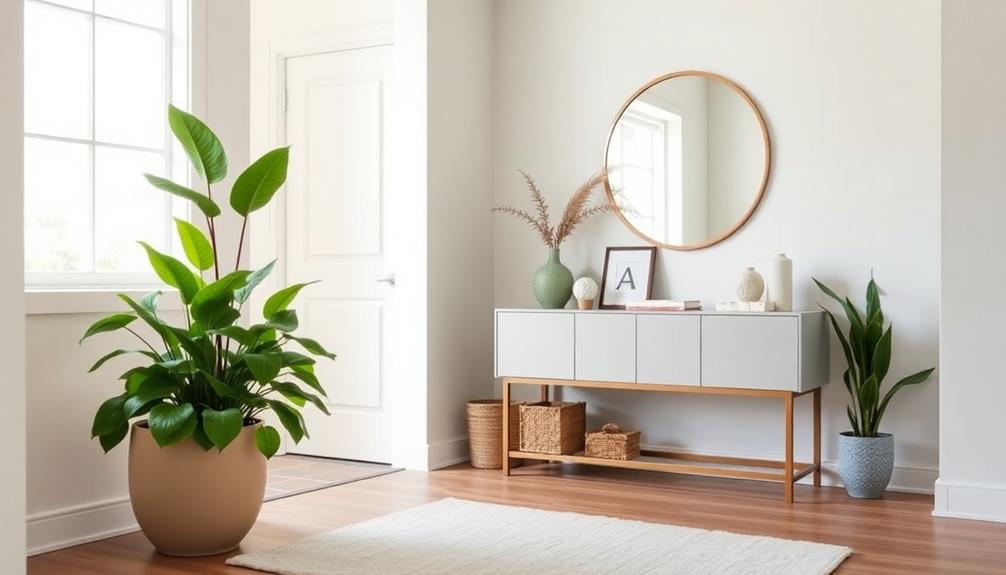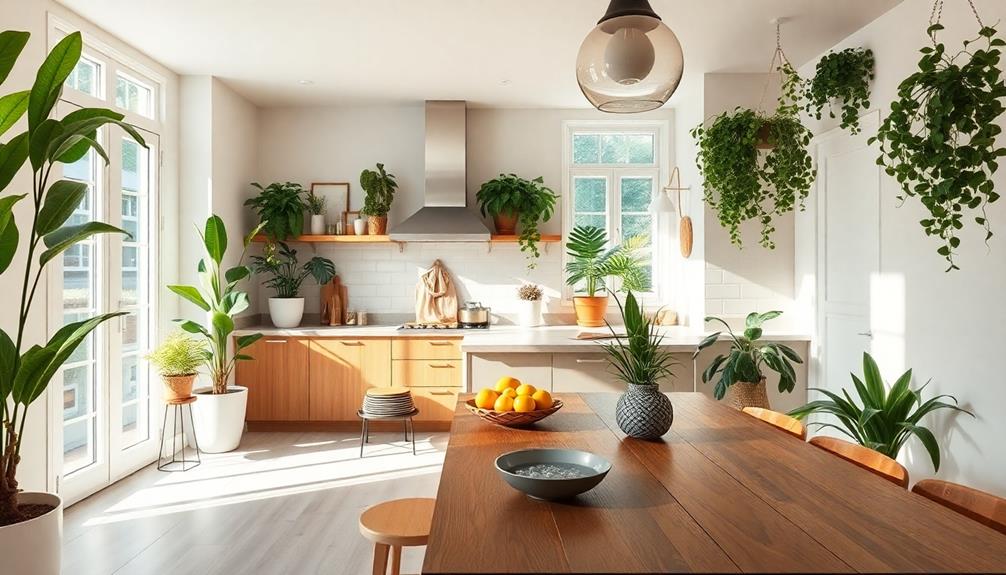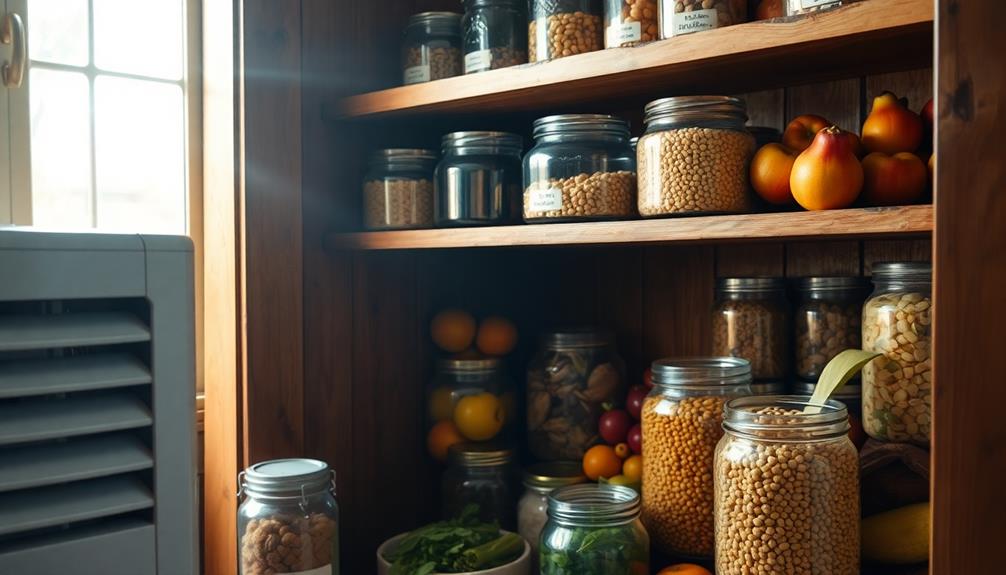You can enhance the energy in your home instantly with these Feng Shui tips. Begin by organizing to enhance the flow in your space and clear any obstacles to chi. Improve your entryway by keeping it tidy and adding colorful plants. When arranging your living areas, place your sofa against a solid wall and create seating in a circular layout for better connection. In the kitchen, keep countertops clear and use warm colors to inspire creativity. Lastly, make your bedroom a peaceful retreat by carefully positioning your bed and incorporating soft lighting. By making these small adjustments, you will create a welcoming environment that encourages positivity and energy. Discover even more tips here!
Key Takeaways
- Declutter regularly to enhance energy flow and reduce stress, creating a vibrant and inviting atmosphere in your home.
- Optimize your entryway by keeping it clean, adding plants, and using mirrors to attract positive energy and opportunities.
- Arrange your living spaces with circular seating and multiple light sources to promote conversation, connection, and a warm ambiance.
- Enhance kitchen energy by organizing countertops, positioning the stove away from the sink, and incorporating fresh herbs for improved air quality.
- Create a restful bedroom by placing the bed away from the door, using light neutral colors, and maintaining a clutter-free environment for better sleep.
Declutter for Better Flow

Decluttering your home is essential for enhancing energy flow and creating a harmonious atmosphere. When you eliminate unnecessary items, you remove obstacles that can impede the movement of chi, allowing positive energy to circulate freely. Incorporating elements of traditional artistry like Indonesian decor masks can add a vibrant touch while honoring cultural heritage.
Start by evaluating your living spaces and identifying clutter that no longer serves a purpose. Regularly discarding these items keeps energy vibrant and prevents stagnation.
Organizing your belongings into designated spaces fosters a clean environment and promotes a sense of calm and control. You'll find that an organized home reduces stress levels and creates a clutter-free sanctuary. Utilizing effective storage solutions, like closed cupboards for coats and shoes, helps maintain a tidy environment. This way, you can easily access what you need without disrupting the overall flow of energy.
As you declutter, you'll notice how a more organized home leads to a more inviting atmosphere, enhancing the overall energy flow. Embrace this process, and watch as your living spaces transform into a haven filled with vibrant energy. You’ll not only feel more at peace but also discover newfound clarity and focus in your day-to-day life. As you make room for positive energy, consider incorporating energyefficient home improvements, such as upgrading to LED lighting or enhancing insulation. These upgrades not only contribute to a sustainable lifestyle but also support the flow of vibrant energy throughout your home.
With each step you take towards decluttering, you're not just tidying up your home—you're cultivating positivity and harmony that benefits both you and your guests.
Optimize Your Entryway

Your entryway sets the tone for your entire home, so optimizing it's essential for inviting positive energy. Start by ensuring your front door is well-maintained and inviting, as it symbolizes wealth and attracts positive energy into your home.
Incorporate beautiful plants, like evergreens, on either side of your entryway to enhance the inviting atmosphere and promote a smooth flow of energy. You might also consider adding vibrant Indonesian decorative pillows on a nearby bench, bringing in cultural heritage through decor while providing comfort.
Keep your hallway clutter-free by storing coats and shoes in closed cupboards. This allows for the uninterrupted circulation of beneficial chi, essential for creating a harmonious environment.
Regularly clean and organize your entryway to prevent stagnant energy accumulation, ensuring a great first impression on both guests and positive energy.
Consider adding a mirror in your entryway. A well-placed mirror can activate positive energy by reflecting light, creating a sense of openness, and inviting new opportunities into your life.
By following these feng shui principles, you'll cultivate a vibrant entryway that not only welcomes guests but also enhances the overall energy of your home.
Arrange Your Living Spaces

Arranging your living spaces thoughtfully can transform your home into a sanctuary of comfort and connection. To embrace the principles of feng shui and enhance the energy flow in your living space, consider these key tips: Incorporating elements of Balinese design can also foster a peaceful atmosphere by using natural materials and open layouts.
- Position your sofa against a solid wall—this creates a sense of security while allowing you to see the entrance, which is essential for good feng shui.
- Opt for a circular seating arrangement—this encourages conversation and connection, helping to avoid sharp angles that can create tension.
- Incorporate multiple light sources—using floor and table lamps adds depth and warmth, promoting a welcoming atmosphere that enhances your home's energy.
Additionally, be mindful not to block doors and windows with furniture. This maintains smooth energy circulation and prevents feelings of confinement.
Rounded furniture and soft textures also help create a space that promotes relaxation and harmony among occupants. By following these straightforward tips, you can effectively arrange your living spaces, fostering an environment filled with positive energy.
Enhance Kitchen Energy

A well-organized kitchen is key to maintaining a harmonious home, just like thoughtfully arranged living spaces.
To enhance the energy in your kitchen, start by positioning the stove away from the sink. This simple change helps avoid the conflict between the fire and water elements, promoting harmony in the space. You can also add a touch of culture with unique pieces like an Indonesian decor mask, which represents rich heritage and can enhance the kitchen's aesthetics.
Next, keep your countertops clear and organized. This creates a sense of order, essential for a nourishing kitchen environment. You can also incorporate fresh herbs or potted plants, which not only improve air quality but also bring in positive energy, making your kitchen feel alive.
Choose warm, inviting colors for your kitchen decor to stimulate appetite and creativity. Avoid excessive black or red tones, as they can clash energetically and disrupt the kitchen's vibe.
Create a Restful Bedroom

Creating a restful bedroom is essential for rejuvenation and tranquility. This space should promote restful sleep and foster a calming atmosphere. Incorporating elements of traditional Indonesian style home decor can enhance the serene ambiance of your bedroom.
Here are three quick tips to enhance your bedroom's energy:
- Position Your Bed Wisely: Place your bed away from the direct line of the door, and guarantee it has a solid headboard against a wall. This setup offers stability and security, making you feel protected as you sleep.
- Embrace Neutral Colors: Use light neutral colors for your decor. These hues create a soothing backdrop that encourages relaxation and promotes a calming atmosphere, allowing your mind to unwind.
- Declutter and Balance: Keep bedside tables on either side of the bed to provide balance and enhance the feeling of partnership in your relationships. Eliminate clutter under the bed to facilitate smooth chi circulation, enhancing your overall energy and guaranteeing better rest.
Incorporating soft lighting, like curvy lamps and scented candles, can further elevate your bedroom's ambiance, transforming it into a sanctuary for peaceful sleep.
Create this harmonious environment, and watch your energy levels soar!
Frequently Asked Questions
How to Bring Positive Energy Into Your Home Feng Shui?
To bring positive energy into your home, keep your front door inviting, declutter hallways, harmonize kitchen placement, add fresh flowers to your dining area, and maintain cleanliness in bathrooms to promote overall well-being and flow.
What Are the 5 Principles of Feng Shui?
To create harmony, you balance chi flow, yin and yang, and the five elements. Position key furniture in command for security, and use the bagua map to enhance specific life aspects, guiding energy effectively throughout your space.
How Do I Make My Room Full of Positive Energy?
To make your room full of positive energy, declutter your space, use calming colors, position your bed wisely, incorporate soft lighting, and add plants. These elements create a serene atmosphere that promotes relaxation and rejuvenation.
How Can I Bring Good Vibes to My Home?
Did you know that a clutter-free environment can boost productivity by up to 20%? To bring good vibes to your home, keep spaces organized, incorporate plants, and create inviting areas for connection and conversation.
Conclusion
So, you thought feng shui was just for ancient temples? Think again! By decluttering, optimizing your entryway, arranging your living spaces, enhancing your kitchen energy, and creating a restful bedroom, you're not just inviting good vibes; you're transforming your entire modern home. Who knew a little balance could lead to such a big boost in energy? Embrace these tips, and watch as your home becomes a sanctuary rather than just another place to crash. Incorporating these **feng shui tips for home** can have an amazing impact not only on your environment but also on your overall well-being. From improving focus to fostering relaxation, each intentional change can ripple into every aspect of your life. Take small steps, and soon you’ll notice a harmonious flow that makes your home feel like a true sanctuary of peace and positivity.









